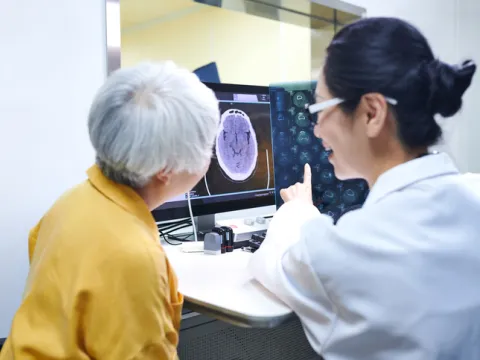- AdventHealth
In March, the U.S. Food and Drug Administration (FDA) granted premarket approval of Edwards Lifescience’s MITRIS RESILIA valve, a tissue-based mitral valve replacement designed to last longer than previous bioprosthetic valves. AdventHealth Orlando Cardiovascular Surgeon Kevin Accola, MD, was among the first to use the new MITRIS valve and participated in the COMMENCE pre-market clinical trial to evaluate its safety and effectiveness.

According to the American College of Cardiology, an estimated 4 million people in the U.S. suffer from significant mitral valve disease process. A number of conditions can cause this, including mitral regurgitation (the mitral valve doesn’t close tightly), mitral stenosis (a narrowing of the mitral valve) and rheumatic valvular disease (permanent valve damage caused by untreated or under-treated streptococcal infection). While some mitral valves can be repaired, others require replacement with an artificial valve, and there are two primary types — mechanical and bioprosthetic.
“Mechanical replacement valves have been around for decades and are still used and appropriate for some patients,” explains Dr. Accola. “These valves require lifelong anticoagulation treatment which can be a burden for younger patients in particular. Bioprosthetic valves incorporate animal tissue and eliminate the need for anticoagulants. However, they have historically proven less durable which has limited their use to older patients.”
A primary challenge with bioprosthetic replacement has been structural valve deterioration caused by calcium buildup on the valve’s tissue over time. The new MITRIS RESILIA, made with bovine pericardial tissue and designed to mimic the native valve, incorporates an anti-calcification, integrity-preservation technology designed to help the valve last longer. This technology also allows the valve to be stored under dry packaging conditions.
In addition, the MITRIS valve features a low-profile frame that helps avoid obstruction of the left ventricular overflow tract by stent posts and is visible under fluoroscopy to facilitate potential future transcatheter interventions for patients, including valve-in-valve implantation.
“We continue to explore new approaches to increase the durability of bioprosthetic valves,” shares Dr. Accola. “The technology built into the MITRIS valve should help mitigate the calcium buildup issue and extend longevity, which could benefit younger patients who have historically had to receive mechanical valves instead.”
The COMMENCE trial included 83 patients in its mitral valve replacement arm along with 694 in an aortic replacement valve arm using the same tissue technology. Patients were followed for five years, and findings included clinically stable hemodynamics (blood flow), minimal regurgitation and no evidence of structural valve deterioration.
A new arm of the COMMENCE trial will explore 10-year outcomes of the MITRIS RESILIA valve, and AdventHealth will participate in that as well.
“At the AdventHealth Cardiovascular Institute, we believe in continually improving patient care and outcomes,” says Dr. Accola. “That is why we are committed to staying on the cutting edge of new valve replacement technologies that will allow our patients to have the most advanced solutions for their particular problem.”
To learn more or refer your patient, click here.
Recent News
Approximately 1 billion people throughout the world suffer from tinnitus (ringing in the ears), and it is the number one disability of those who serve in the U.S. military. The condition can disrupt...
Metabolic dysfunction associated steatotic liver disease (MASLD), formerly referred to as nonalcoholic fatty liver disease (NAFLD), affects about 70% of people with type 2 diabetes, placing them at...
AdventHealth East Orlando recently became the first hospital in Florida to earn Advanced Foot & Ankle Surgery Certification from DNV, a worldwide, independent certification body.
With an aging population and increases in the prevalence of neurological conditions like Alzheimer’s disease and dementia, physicians and patients alike continue to seek new tools and approaches to...
In a new article published in the medical journal Age and Ageing, AdventHealth Research Institute’s Dr. Audrey Collins shares the results of a recent study evaluating the impact of exercise on...
The AdventHealth Neuroscience Institute is the first in Florida and one of the first in the country to begin recruiting patients with primary progressive or non-active secondary progressive multiple...
Accurately determining food intake remains a challenge in nutrition research. A new study published in Nature Metabolism and co-authored by Dr. Corbin introduces a metagenomics-powered approach to...
Discover what’s being accomplished in Central Florida to bridge the health gap with Orange County Mayor Jerry Demings and AdventHealth’s Dr. Alric Simmonds.
Breakthrough device offers new hope for stroke survivors struggling with rehabilitation following ischemic stroke
Jennifer Seminerio, MD, recently became one of the first in Florida to use intestinal ultrasound (IUS) to help assess and manage treatment of patients with inflammatory bowel disease (IBD). A non...
The Convergent Hybrid Ablation procedure has been gaining acceptance as an effective treatment option for long-standing persistent atrial fibrillation (AFib) since the CONVERGE trial data published in...
Recently, AdventHealth for Children pediatric orthopedic surgeon Sean Keyes, DO, Katelyn Smith, PA-C, and their team performed their 100th bridge-enhanced anterior cruciate ligament (ACL) repair (BEAR...












